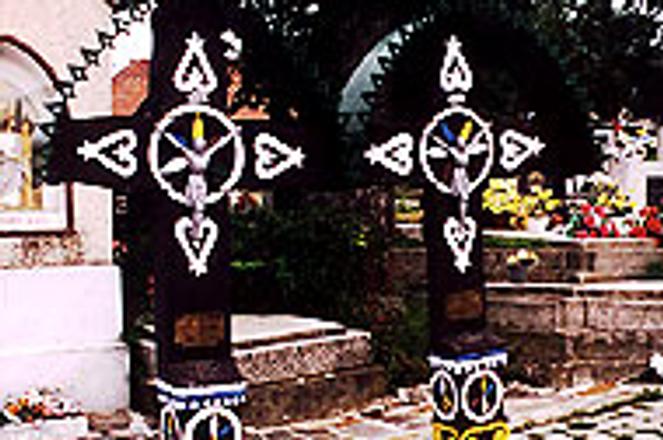ART with a purpose.photo: Jarmila Hlávková
PERHAPS the best time to visit Detva is during the second weekend in July when this small and seemingly quiet town in the heart of Slovakia hums with life. It is at this time of year that Detva plays host to singers and dancers from all corners of Slovakia and around the world, gathering at the annual Folk Festival Under Poľana. What was once a local event, showcasing the distinctive folklore of the Podpoľanie region has now outgrown its regional boundaries and become famous nationwide.
What is it that makes Detva and Podpoľanie so exceptional?
Podpoľanie translates as "the lands under Poľana", which is a mountain that used to be an active volcano long ago. Between the 15th and 17th centuries these lands were colonised by valasi - mountain people of Ukrainian, Romanian, and Slovak descent. They grew a hardy breed of mountain sheep that could survive tough winters and the harsh conditions of local forests.
Good quality wood was abundant and this was used to make charcoal. It is no wonder that in 1638 László Csáky, a local nobleman, decided to make a profit out of this good-selling commodity and set up the hamlet of Detva. It later grew into what historian Matej Bel dubbed the "famed village of Detva". The rustic beauty of the place and the people, as well as their pure, soft language, inspired the poet Andrej Sládkovič to write a famous epic named after the town - Detvan.
GOLIANOVÁ's shop offers a picture-perfect look at local life.photo: Jarmila Hlávková
For all this fame, Detva still remains undiscovered by the casual tourist. A county town of 15,000 inhabitants, including the people in the remote areas at the foot of Poľana, it has a lot to offer to the discerning visitor. It is pretty and clean with many town features as well as a distinct rural feel. Just off the main road from Bratislava to Košice via Zvolen, it is easy to reach by car or bus.
Seeking a bit of peace and quiet?
There are plenty of hiking or cycling tracks around. You do not even need to bring a bike, as one can be rented at a local cycling club (see www.cyklo.sk or call 045/5457-693), which also serves as an information centre. There will provide you with good advice, a guide, maps, and books, as well as e-mail facilities. It is closed on weekends but they are ready to help visitors anytime if asked in advance. The office is conveniently placed next to the Detva Hotel (see www.detva.biz or call 045/5454-392, 045/5456-480), a short walk from the bus station. The hotel offers single, double, and triple rooms, all very reasonably priced.
Feel like good company?
STEADY hands at work.photo: Jarmila Hlávková
Make friends at a local pub. After a drink of slivovica (plum brandy) or rožovka (a strong alcohol made from rye), you will happily drift into the local folklore. Even without karaoke machines it is easy to join in their lively songs, or you might attempt the vibrant Detvan dance. Whatever your choice, it is probably wiser to find the dancers of Detva's two folk ensembles. If you ask them nicely, they might even show you a step or two.
Attracted by folklore?
For those who are more serious about studying the local culture, there is Veronika Golianová's Folk Art Shop in the upper part of the town. It is a treasure trove of embroidery and other handmade gifts. Delicate folk costumes richly adorned with typical Detvan embroidery will undoubtedly appeal to your sense of beauty. You will be shown the special technique of working with the krivá ihla (a kind of hooked needle), and may be tempted to try it yourself.
More curiosities await visitors at the regional museum just across the road. Apart from old historical documents, it houses a unique exhibition of folk musical instruments and the longest handmade chain in the world (31.62 metres). It is carved from a solid piece of wood and aspires for a place in The Guinness Book of World Records.
Outside in the courtyard is the workshop of a local master dedicated to restoring the ornamented wooden crosses of Detva's cemetery. These can also be found at rural crossroads or in churchyards, and some are over 100 years old. Plain or painted in rich colours, they are the handmade work of skilled woodcarvers. Those that have been restored to date are exhibited above the cemetery's Funeral House.
Wherever you turn in Detva or Podpoľanie, you are bound to receive a very warm welcome from the locals. Hospitality and cheerful generosity is part of their character. And so, in your search for gems, you may find some among the people.
Author: Jarmila Hlávková


